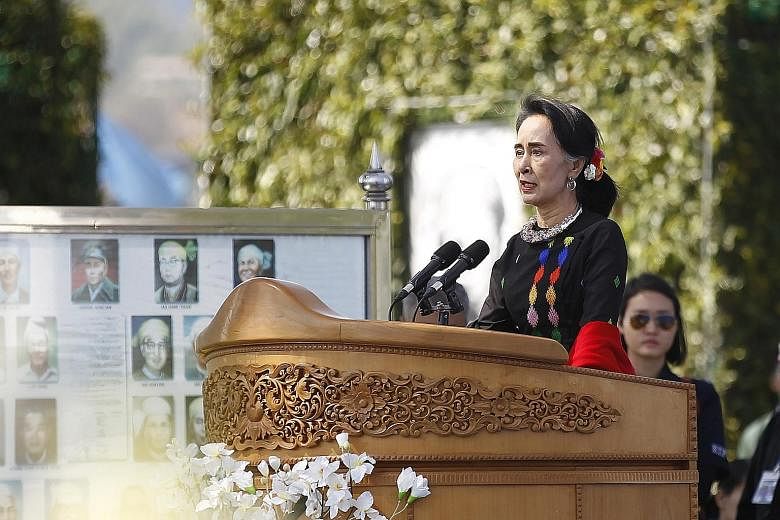PANGLONG (Myanmar) • De facto leader Aung San Suu Kyi urged all of the country's armed ethnic groups to sign a ceasefire agreement, as her government seeks to end decades of conflict between the military and armed ethnic groups, reported the Associated Press.
Speaking during the annual Union Day celebrations yesterday, Ms Suu Kyi said that ethnic groups who had not joined the peace process could still participate in the movement for peace by signing the Nationwide Ceasefire Agreement (NCA).
This landmark deal was agreed upon by the previous government and eight of the organisations in 2015.
"I want to ask those ethnic groups who haven't signed the nationwide ceasefire to trust yourself and sign it and please participate in our 21st Century Panglong Conference," Ms Suu Kyi said, referring to the major ethnic peace conference that was first held in August last year.
The second meeting of the conference will be held in Naypyitaw on Feb 28, with about 700 representatives participating, reported Xinhua last week, citing the official Global New Light of Myanmar.
Ms Suu Kyi was speaking yesterday in the town of Panglong, located in restive Shan state, where the government held a state ceremony to mark the 70th anniversary of the country's Union Day.
Union Day marks the original Panglong agreement, which was brokered by Ms Suu Kyi's father, national hero General Aung San, along with ethnic Shan, Kachin and Chin leaders in 1947. The agreement granted a level of autonomy to major ethnic groups if they cooperated with the federal government to separate from Britain.
That agreement, however, unravelled five months after the deal was reached when Gen Aung San was assassinated. Since then, ethnic groups have alleged that successive governments failed to adhere to the agreement.
Ms Suu Kyi also urged all stakeholders in the peace process yesterday to make sacrifices in the interest of the people.
Myanmar has suffered more than half a century of armed conflict involving ethnic rebels since its independence.
Ms Suu Kyi made the peace process her government's top priority when she took office last year, and has tried to start a dialogue with ethnic armed groups to craft a lasting peace deal. But fighting continues between the military and groups that were not party to the ceasefire deal reached in 2015.
Ms Suu Kyi and her National League for Democracy (NLD) party have faced growing pressure as clashes continue in the country's north between the army and the Kachin insurgents.
The military has stepped up military offensives, and the country's leading ethnic groups have voiced concern that the peace process remains out of reach.
Ms Suu Kyi has also come under criticism from rights groups for ignoring the plight of the Rohingya minority, amid allegations of human rights abuses against the Rohingya Muslims living in Myanmar's Rakhine state.

